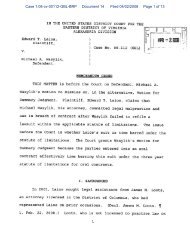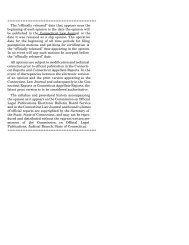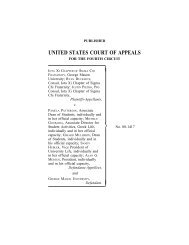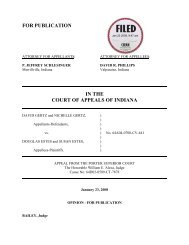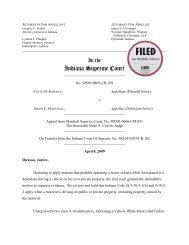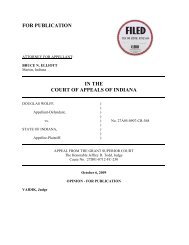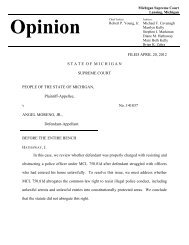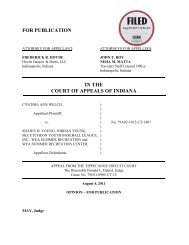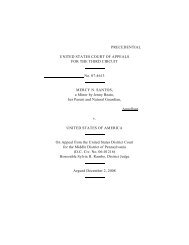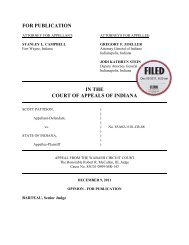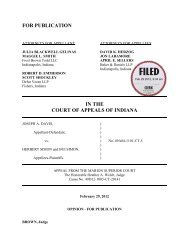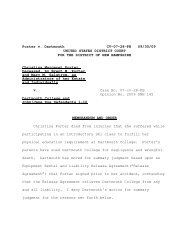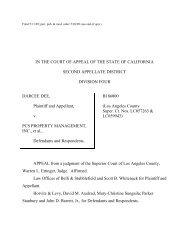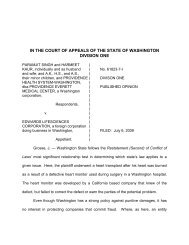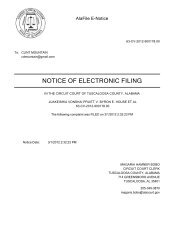07SA319 People of the State of Colorado v. Travis Lee Jewell ...
07SA319 People of the State of Colorado v. Travis Lee Jewell ...
07SA319 People of the State of Colorado v. Travis Lee Jewell ...
You also want an ePaper? Increase the reach of your titles
YUMPU automatically turns print PDFs into web optimized ePapers that Google loves.
<strong>07SA319</strong> <strong>People</strong> <strong>of</strong> <strong>the</strong> <strong>State</strong> <strong>of</strong> <strong>Colorado</strong> v. <strong>Travis</strong> <strong>Lee</strong> <strong>Jewell</strong> - February 4, 2008 - <strong>Colorado</strong> Supreme Court Opinions<br />
http://www.cobar.org/opinions/opinion.cfm?opinionid=6484&courtid=2 (4 <strong>of</strong> 5) [2/20/2008 10:29:24 AM]<br />
(Colo. 2001). Factors a court customarily considers include, but are not limited to:<br />
"<strong>the</strong> time interval between <strong>the</strong> initial Miranda advisement and any subsequent<br />
interrogation; whe<strong>the</strong>r and to what extent <strong>the</strong> interrogating <strong>of</strong>ficer reminded <strong>the</strong><br />
defendant <strong>of</strong> his or her rights prior to <strong>the</strong> interrogation by asking if <strong>the</strong> defendant<br />
recalled his or her rights, understood <strong>the</strong>m, or wanted an attorney; <strong>the</strong> clarity and<br />
form <strong>of</strong> <strong>the</strong> defendant’s acknowledgement and waiver, if any; <strong>the</strong> background and<br />
experience <strong>of</strong> <strong>the</strong> defendant in connection with <strong>the</strong> criminal justice system; <strong>the</strong><br />
defendant’s age, experience, education, background, and intelligence; and whe<strong>the</strong>r<br />
<strong>the</strong> defendant has any language barrier in understanding <strong>the</strong> advisement." <strong>People</strong><br />
v. Platt, 81 P.3d 1060, 1065-66 (Colo. 2004).<br />
In addition to <strong>the</strong>se factors, <strong>the</strong> defendant’s intoxication at <strong>the</strong> time <strong>of</strong> <strong>the</strong> Miranda<br />
warning is also one <strong>of</strong> <strong>the</strong> factors <strong>the</strong> trial court may consider when assessing <strong>the</strong><br />
validity <strong>of</strong> a Miranda waiver. Id., 81 P.3d at 1066. Specifically, in cases where, as<br />
here, <strong>the</strong> intoxication is self-induced, <strong>the</strong> trial court should examine whe<strong>the</strong>r <strong>the</strong><br />
defendant was so intoxicated that he or she could not have made a knowing and<br />
intelligent waiver. May, 859 P.2d at 882. We have previously found that "[t]he fact<br />
that self-induced intoxication diminishes a defendant’s mental faculties does not<br />
necessarily invalidate his Miranda waiver." Platt, 81 P.3d at 1066. Intoxication only<br />
invalidates an o<strong>the</strong>rwise valid Miranda waiver if <strong>the</strong> court finds through a<br />
preponderance <strong>of</strong> <strong>the</strong> evidence that <strong>the</strong> defendant was incapable <strong>of</strong> understanding<br />
<strong>the</strong> nature <strong>of</strong> his rights and <strong>the</strong> ramifications <strong>of</strong> waiving <strong>the</strong>m. Id.<br />
When determining whe<strong>the</strong>r intoxication makes a waiver unknowing or<br />
unintelligent, we consider several factors, including: whe<strong>the</strong>r "<strong>the</strong> defendant<br />
seemed oriented to his or her surroundings and situation; whe<strong>the</strong>r <strong>the</strong> defendant’s<br />
answers were responsive and appeared to be <strong>the</strong> product <strong>of</strong> a rational thought<br />
process; whe<strong>the</strong>r <strong>the</strong> defendant was able to appreciate <strong>the</strong> seriousness <strong>of</strong> his or<br />
her predicament, including <strong>the</strong> possibility <strong>of</strong> being incarcerated; whe<strong>the</strong>r <strong>the</strong><br />
defendant had <strong>the</strong> foresight to attempt to deceive <strong>the</strong> police in hopes <strong>of</strong> avoiding<br />
prosecution; whe<strong>the</strong>r <strong>the</strong> defendant expressed remorse for his or her actions; and<br />
whe<strong>the</strong>r <strong>the</strong> defendant expressly stated that he or she understood <strong>the</strong>ir rights."<br />
Kaiser, 32 P.3d at 487-89.<br />
In Kaiser, we applied <strong>the</strong> aforementioned factors to find that a developmentally<br />
delayed woman acted knowingly and intelligently when she waived her Miranda<br />
rights. There, <strong>the</strong> <strong>People</strong> demonstrated that <strong>the</strong> defendant possessed a sufficient<br />
understanding <strong>of</strong> <strong>the</strong> rights she was waiving. Specifically, after reading <strong>the</strong><br />
defendant her Miranda rights, an <strong>of</strong>ficer asked <strong>the</strong> defendant what "<strong>the</strong> right to<br />
remain silent" meant. She replied that it meant she "didn’t have to say anything."<br />
Id. at 482. We concluded that this statement showed that she possessed sufficient<br />
understanding <strong>of</strong> her right to remain silent that she could knowingly and<br />
intelligently waive it. Id.<br />
Similarly, in Platt, we applied <strong>the</strong> factors mentioned in Kaiser to find that a<br />
defendant’s heavy drug use did not make a knowing and intelligent Miranda waiver<br />
impossible. 81 P.3d at 1063. We held that while <strong>the</strong> defendant had used drugs in<br />
<strong>the</strong> hours prior to <strong>the</strong> admissions, he still acted knowingly and intelligently. Id. at



